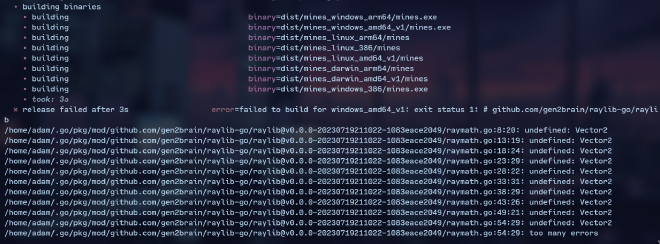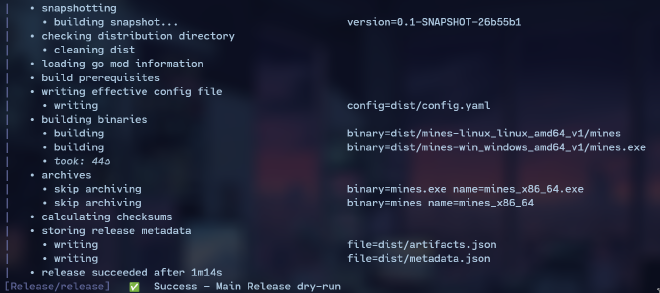Introduction #
I recently revisted my mines project that uses raylib-go - a wrapper for an amazing graphics library called raylib. After doing some cleaning up and laughing at some of my old code (duh) I thought it would be a great idea to make a Github release to allow others to download the app. For streamlined releases, I turned to my preferred tool, Goreleaser.
The Challenge #
After setting up a basic .goreleaser.yaml file in the root of the repository and running goreleaser release --clean --snapshot I noticed that we get some weird errors which look like C import errors.

This makes sense, raylib is a C library and raylib-go is just a wrapper using the C & Go interoperability to achieve smooth integration, but this poses a problem for our automatic releasing environment. The raylib-go README says that if we want to build our binary for windows not only do we need the base library requirements, but also the mingw windows compiler toolchain. Let’s try to do that first on our own, before automating it. After installing the mingw compiler we need to tell the Go compiler that our target is windows and also we want to enable CGO (the interoperability layer) and what compiler we want to use:
GOOS=windows GOARCH=amd64 CGO_ENABLED=1 CC=x86_64-w64-mingw32-gcc go build -o mines.exe main.go
This actually works, and if we really want to, we can just make our own release locally and upload it to Github right from our computer, but our goal is to avoid manual intervention and perform the release process using Goreleaser. How can we transition these steps into a Goreleaser configuration?
Local Goreleaser Usage #
Let’s replicate the above command using goreleaser! For every build, we must set the CGO_ENABLED=1 environment variable. Since different compilers are needed for Windows and Linux, we define two builds, each with their own CC and CXX compilers:
env:
- CGO_ENABLED=1
builds:
- id: mines-win
goos:
- windows
goarch:
- amd64
env:
- CC=x86_64-w64-mingw32-gcc
- CXX=x86_64-w64-mingw32-g++
- id: mines-linux
goos:
- linux
goarch:
- amd64
env:
- CC=x86_64-linux-gnu-gcc
- CXX=x86_64-linux-gnu-g++
archives:
- format: binary
name_template: >-
mines_
{{- if eq .Arch "amd64" }}x86_64
{{- else if eq .Arch "386" }}i386
{{- else }}{{ .Arch }}{{ end }}
Now if everything went as expected and we have all the dependencies, the release will succeeed! But only on our local machine, where we have the raylib dependencies and the windows compiler toolchain. Let’s try moving to the cloud!
Github workflow #
Let’s start with this basic workflow. Let’s create a file in .github/workflows/release.yml.
name: Release
on:
push:
tags:
- '*'
jobs:
release:
runs-on: ubuntu-latest
steps:
- name: Checkout
uses: actions/checkout@v3
- name: Setup go
uses: actions/setup-go@v3
with:
go-version: '1.20.0'
- name: Run GoReleaser
uses: goreleaser/goreleaser-action@v4
with:
distribution: goreleaser
version: latest
args: release --clean --snapshot
env:
GITHUB_TOKEN: ${{ secrets.GITHUB_TOKEN }}
Now let’s this Github action locally with act. We will find ourselves with this view:

The goreleaser-action lacks have the dependencies that we talked about earlier. How can we fix that? We need a system that:
- Supports package releases
- Contains the necessary Windows compiler toolchain (or macOS counterpart)
- Includes the
raylibdependencies
It just so happens that goreleaser has a tool called goreleaser-cross. It is a docker image which has all the cross-compiling dependencies already built in (and has goreleaser obviously).
Goreleaser-cross #
We need to create an environment in which our action can run the goreleaser-cross docker image and add the raylib dependencies before doing that. To add the raylib dependencies create a Dockerfile in the root of the project.
FROM ghcr.io/goreleaser/goreleaser-cross:v1.20.0 # Use goreleaser-cross as the base image
RUN apt-get update -y # Update
RUN apt-get install -y libgl1-mesa-dev libxi-dev libxcursor-dev libxrandr-dev libxinerama-dev # Install raylib deps
Also, create a Makefile to be able to build and run the images easily:
PACKAGE_NAME := github.com/TypicalAM/mines
.PHONY: release-dry-run
release-dry-run:
@docker build -t mines .
@docker run \
--rm \
-e CGO_ENABLED=1 \
-v /var/run/docker.sock:/var/run/docker.sock \
-v `pwd`:/go/src/$(PACKAGE_NAME) \
-w /go/src/$(PACKAGE_NAME) \
mines \
--clean --snapshot
.PHONY: release
release:
@if [ ! -f ".env-release" ]; then\
echo ".env-release is required for release";\
exit 1;\
fi
@docker build -t mines .
@docker run \
--rm \
-e CGO_ENABLED=1 \
--env-file .env-release \
-v /var/run/docker.sock:/var/run/docker.sock \
-v `pwd`:/go/src/$(PACKAGE_NAME) \
-w /go/src/$(PACKAGE_NAME) \
mines \
release --clean
Now run make release-dry-run to verify that the docker image works and the release compiles as expected. Let’s also modify the github workflow to use our Makefile. Remember that the Makefile uses a .env-release file to infer the Github release token, we need to provide that for the official release:
name: Release
on:
push:
tags:
- '*'
jobs:
release:
runs-on: ubuntu-latest
steps:
- name: Checkout
uses: actions/checkout@v3
- name: Setup go
uses: actions/setup-go@v3
with:
go-version: '1.20.0'
- name: Release dry-run
run: make release-dry-run
- name: Create dotenv for release
run: echo 'GITHUB_TOKEN=${{ secrets.GITHUB_TOKEN }}' > .env-release
- name: Release publish
run: make release
Let’s test for the last time using act. We cannot really check the final release, because we don’t have a Github release token ready. Also remember to create a secret on Github for the final release!

After a challenging journey, we succeeded. The beauty of this solution lies in its adaptability – you can readily apply a similar approach to various scenarios you encounter. All the files discussed in this article can be found in my mines repository on GitHub. If you found this post helpful, consider giving it a star. Best wishes on your projects!